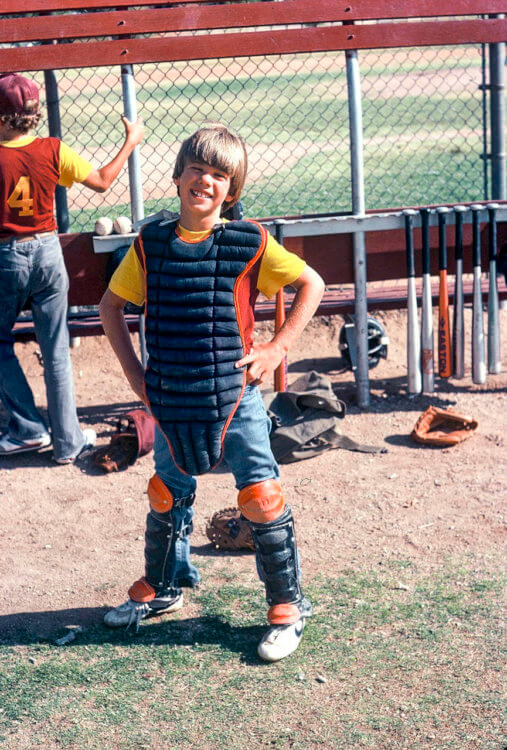Well, folks, it’s really nice to be back in school. Our Spring Break was needed, but with the extra three days we had to take off because of a power outage, I think it is safe to say we are all glad to be back. As I walked campus today and poked my head into classrooms, you could sense that everyone was excited to get back into the routine.
It was good to see our sports teams outside yesterday for the first time in a while. It’s that time of the year when we kids of all ages are back outside playing various organized athletic activities. Like so many Colorado Academy students, I benefited from going to a school that promoted equal and active involvement in arts and athletics. Aside from being a three-season athlete, I also played trumpet, sang in the choir, and performed in various theater productions. I think this balance is so critical. But, since we are in the middle of March Madness and are launching spring sports, I thought I’d offer a few thoughts on rationality and sports.

As a kid, most of my coaches were pretty laid back. In Middle School, I played on a baseball team that was coached by a bunch of law students who were, frankly, hilarious. They didn’t take things too seriously. Our sponsor was the Quick Mart. Like Walter Matthau in the great film The Bad News Bears, my coaches brought a cooler to practice and enjoyed various adult beverages while working with children. I played catcher and got to listen in on their banter and jokes. They had little expectation for discipline or standards. In fact, they would let me show up to practice in shorts.
Somehow, I made the All-Star Team that season. I was super excited until I saw the name of the coach—Coach Hoffman. Coach Hoffman was the classic, type-A, win-at-nearly-all-cost youth coach that we see a little too regularly. He clearly had gifts as a strategist of 11-year-olds. But, he was tough and had the whole look of a youth coach in the late 1970s: he wore the polyester shorts, the hiked-up tube socks, the trucker hat, silver sunglasses, and carried a whistle. He had been my Fifth Grade soccer coach, and I vividly recall him giving a halftime speech trying to motivate us to do better. At his feet were little Ziploc bags of oranges that were supposed to be our snack. As he was yelling at us, one poor kid asked innocently, “Coach Hoffman, can we have some oranges?” At this point, the coach pretty much exploded and started throwing the bags at us full speed: “You want a ____ing orange, here you go!” Fast forward to my All-Star baseball team experience. I made the critical error of showing up to the first practice in shorts. Big mistake. He made me run two miles before he would let me on the field.
I get to see lots of athletic contests and have witnessed all kinds of coaching styles. At a lacrosse tournament a few years ago, I wish I had a video camera to record the many examples of negative behavior. Coaches screaming at kids. Parents screaming at refs (who, by the way, were all teenagers). Parents cheering when other kids got hurt. It was an awful display of humanity. Yet, I also know that some of the most impactful coaches and teachers I had were the ones who pushed me the hardest and had high standards. Coach Hoffman was probably right to make me run for coming unprepared. There was my club soccer coach, Ariel Stohler, a Norwegian immigrant, who was hard as nails. There was my swim coach Chris Harrison who knew how to get the best out of you, but, if you messed up, he let you know it in ways that would probably get most coaches fired today. There was Coach Don Berger, a former NYPD police officer, who coached me throughout high school in baseball and soccer. During pre-season, Berger would put us on a bus, drive us about five miles from campus, open the doors, and say in his thick New York accent, “See you fellas back on campus.” (Note: I should mention that this was in August in Tucson, and the temperatures were easily above 100 degrees and water was not provided on the run.)
Despite their toughness, there was a love and understanding of kids that all of these other coaches had. (And, to be fair, Mr. Hoffman had it, too. He just tended to lose his cool more often.) In the era of “everyone gets a trophy,” I think we struggle with how to push to raise the level of their performance without beating young people down or adding to the anxiety of an already stressed-out generation. I was used to being yelled at routinely by adults growing up. Almost none of it was effective in changing my behavior. Educators don’t act this way any more because of the voluminous research that shows how counterproductive it is, but some adults look back nostalgically at this earlier era of motivation.
Over March Madness, there was a story about Michigan State University Coach Tom Izzo who lost his cool with one of his players. The interaction divided sports fans about what is the proper way to motivate people. Some decried it as archaic and ineffective. Others defended it as a way of teaching young people tough lessons. Here are two views of the same incident:
Take #1:
Take #2 (click to view):
https://www.foxsports.com/watch/undisputed/video/1463044675833
To be sure, professional and collegiate sports are completely different from high school or youth athletics. As we know, collegiate players—particularly in high profile sports— are essentially professional athletes who aren’t being paid for their labor. So, I can understand a tougher approach with players when so much is on the line related to the win/loss record. But, if you look at some of the best coaches in the history of sports, many are far more positive in their approach to player development. At CA, we subscribe to a philosophy of positive coaching and helping kids manage and confront adversity, stress, and challenge. We want to build an approach that engages kids and helps them be their best. When you develop the right systems and processes, the results tend to come.
For you young parents, I might remind you that a danger of youth sports is how it can sap the fun out of childhood. There are some great things about playing on a team at a young age. But, I encourage you to watch this video of a 4-year-old hockey player. His dad put a microphone on him at practice just to hear what he had to say. This might be one of the funniest videos out there, and it should remind us that one of the most important reasons to play sports is to have fun with your friends. And, not to get too insane about winning and losing when it comes to youth athletics.
So, while I am on my soapbox, I would really like CA to continue its strong record as a community that upholds sportsmanship and citizenship. Parents, let’s be good role models. Yelling at a referee or umpire is not effective. It models bad behavior for kids. Life will be unfair, and there will be bad calls. When that happens, you need to keep playing. You should not expect perfect officiating at this level —it doesn’t even happen at the professional level.
I had a unique experience in college working at a school on the Navajo reservation. I helped coach the baseball team, and before every game, the team would say a prayer. It went:
“Dear God.
Dear Holy People.
May we play well.
May they play well.
Thank you God.
Thank you Holy People.”
That always stuck with me. My favorite athletic contests were the close ones: when both teams played hard and came away respecting one another. Sometimes we won, and sometimes we lost. And, that was OK.
